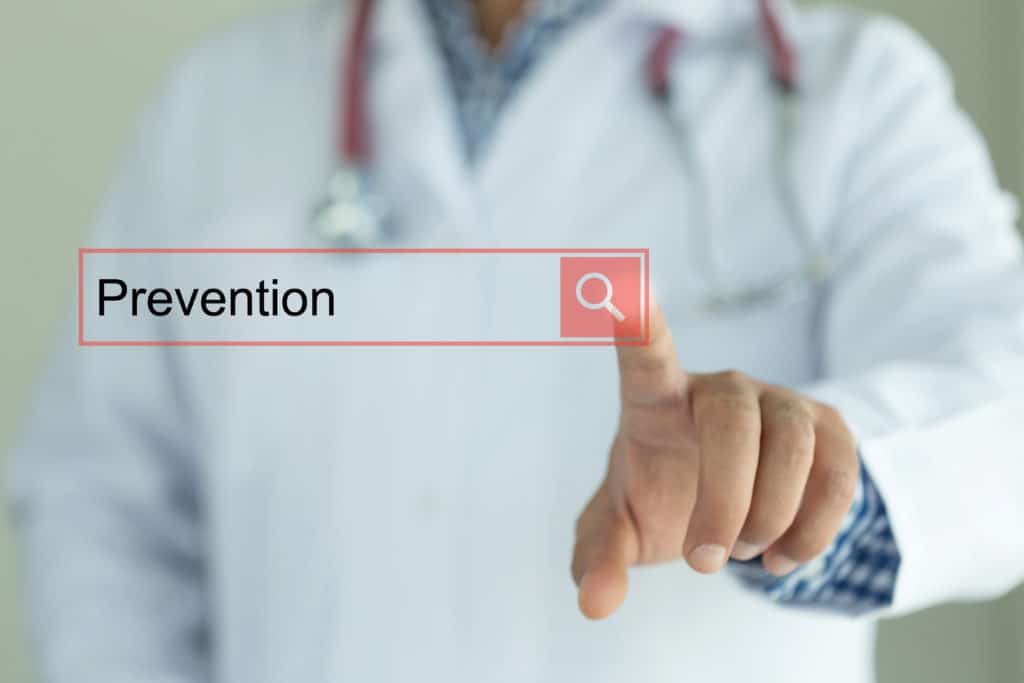Cancer, unfortunately, is quite a common diagnosis among people, especially those of older age. However, some types of cancer can be managed or effectively prevented. This blog will be going through the top 8 cancers that can be prevented to a good degree and factors in your control that will help you do just that!
No cancer can be prevented fully. However, according to the World Health Organisation between 30% and 50% of all worldwide cancer cases are preventable (WHO, 2022). For the UK specifically, 2015 research by Cancer Research UK found that 38% of cancer cases are preventable.
Further, effective management of controllable risk factors, such as your diet, physical activity level, smoking and drinking habits, can lower your risk of developing certain cancers even more. The WHO, Cancer Research UK and many scientific studies – Seitz & Becker, 2007, Sasco et. al., 2004, Wolin et al., 2010 – found that the main factors associated with increased cancer risk are the following:
- Tobacco use
- Obesity
- UV radiation
- Occupational risks
- Infections
- Alcohol
- Air pollution
This is especially true for the following cancers:
-
Breast cancer:
In the UK there are around 55,900 new cases of breast cancer each year. It is the most common type of cancer accounting for 15% of all cancer cases (Cancer Research UK, 2022). Luckily, with the improvements in technology and the introduction of preventive health checks, the number of survivors has increased. 76% of people diagnosed with breast cancer survive for 10 or more years. 23% of breast cancer cases are preventable.
Of course, the risk of developing breast cancer changes over time due to factors that are outside of our control such as gender and age – simply by being a female your risk of developing breast cancer is higher.
-
Lung cancer
If you are a former or current smoker, you have a higher risk of developing lung cancer, and it is encouraged that you talk to your doctor regarding the health of your lungs. Even if you smoked a long time ago it is still good to have a screening to ensure you are in good health.
Non-smokers also have a risk of developing lung cancer whether it is through long-term exposure to second-hand smoke or air pollution. Reducing your exposure to these factors will lower your risk significantly more.
Lung cancer is the most common cause of cancer death in the UK accounting for 21% of all cancer deaths in 2018 (Cancer Research UK). There are about 48,500 new cases each year, however, this number would be much lower with better preventive methods as the statistics show that 79% of lung cancer cases in the UK are preventable as they are mostly caused by smoking (72%).
-
Colon cancer
Colon cancer (also called colorectal or bowel cancer) screenings are the most powerful tool that we have in preventing colon cancer. While it is not possible to reduce risk entirely, you can reduce your risk of developing colon cancer to a negligible percentage if you take care of your health and have regular screenings. Most colon cancers develop from pre-cancerous polyps that are not malignant and if removed will never be cause for concern.
For a more in-depth look at how colon cancer can be prevented have a look at our recent blog about the potential of eradicating colon cancer.
-
Prostate cancer
Prostate cancer is the most common cancer among men in the UK and the US with around 52,300 and 170,000 new cases found each year in the respective country. Fortunately, of those diagnosed with this cancer, 78% survive for 10 or more years (Cancer Research UK, 2022).
As we mentioned before, no cancer is 100% preventable, however, if you regularly have health screenings and take control of certain factors of your lifestyle, you are likely to reduce your risk.
-
Cervical cancer
This type of cancer is not common and is highly preventable. According to Cancer Research, 99.8% of cervical cancer cases can be prevented. This is because most cervical cancer cases are due to the human papillomavirus (HPV) and if you have the HPV vaccine, you are protected against 9 different branches of the virus.
-
Skin cancer
Skin cancer is usually developed through prolonged exposure to the sun. It can affect anyone from children to older people. A self-exam is beneficial as by looking at your skin you would be able to track any changes in mole shape, size, or colour. Most skin cancers can be highly preventable, especially if it is a melanoma which can be prevented in 86% of cases and has a 10 (or more) year survival rate of 87%.
To efficiently protect your skin all year, you should wear sunscreen that covers a broad spectrum of UV rays and is water-resistant. To find out more about the types of skin cancer and how to protect yourself and reduce the risk of developing skin cancer check our previous blog!
-
Ovarian cancer
Similarly to breast cancer, women are more likely to be at risk of developing ovarian cancer. Incidence rates of ovarian cancer are highest for those aged 40+ and in particular those aged 75 and over, with around 28% of all new cases (Cancer Research UK, 2022).
There are no clear preventive methods for this type of cancer however, regular checks and checking if you carry the BRCA1 or BRCA2 gene may help reduce your risk. Always have a chat with your doctor and be aware of family history as this may increase the risk of developing ovarian cancer.
-
Testicular cancer
In the UK men between the ages of 30 to 34 are most commonly diagnosed with testicular cancer. In total there are about 2,400 new cases each year (Cancer Research UK, 2022). A self-exam is an effective way to check for yourself, and is in fact, quite a common way to find testicular cancer. Alternatively, a visit to your GP for a health screening will also help.
The testicular cancer survival rate is improving every year and has increased in the last 40 years in the UK, probably because of combination chemotherapy and preventive screening during regular health checks.
Changes you can make to reduce cancer
As mentioned, if you have concerns it is best to talk to your doctor and they will be able to direct you through a health screening. You may also consider a private health assessment such as with us at Echelon Health.
Both options are good if you have immediate concerns, a family history of developing cancer or just want peace of mind that you are in optimal health.
With that being said, there are many things you can add as preventive measures or change your lifestyle to reduce the risk of developing a few of the cancers mentioned above:
- Start regular screenings from age 40
- Understand your family history
- Maintain a healthy diet and weight
- Stay active
- Reduce alcohol consumption
- Stop smoking and avoid second-hand smoke
- Get an HPV vaccine
- Get a pap/smear test
- Reduce the number of sexual partners
- Use condoms
- Wear appropriate PPE at work to prevent work with substances such as arsenic, asbestos, radon, and radiation
- Wear sunscreen and avoid sunburns
- Avoid tanning beds
- Wear hats
- Carry out self-exams for your breasts, testicles, and skin
- Breastfeed
- Take birth control pills
Cancer screening at Echelon Health
Echelon Health aims to equip people with sound knowledge of their health and allow them to take control of how they take care of themselves. We know that there is no ‘one size fits all’ approach when it comes to your concerns and unique circumstances.
This is why we have created special health assessment packages that cater to everyone’s needs. When it comes to cancer detection, we created the Core Cancer package.
This assessment was created to detect the highest risk cancers at the earliest possible stage. It screens for cancers such as leukaemia/lymphoma, breast, prostate, colon, pancreatic, liver, thyroid, kidney, and adrenal glands, as well as ovaries/testes. This assessment is ideal for clients who may have a family history of cancer.
Apart from being able to scan for the aforementioned cancers, the Core Cancer package is important because at Echelon Health we use the right modality for the right area of the body. This allows us to see, in great detail, the soft and hard tissue/organs in your body to get the best possible results and determine if there are any potential problems with your health. As with all of our assessments, we use what is considered the gold standard for detecting early signs of cancer.
The Core Cancer package includes the following exams:
- Medical Questionnaire
- & Pre-Assessment
- Blood Tests
- CT Abdomen
- CT Pelvis
- CT Virtual Colonoscopy
- MRI Prostate
- Ultrasound Thyroid
- Ultrasound Testes/ Ovaries
- Digital Mammogram
- Final Consultation
If you are interested in a fully comprehensive head-to-toe check, we have the Platinum Assessment which is one of the most comprehensive in the world. It can detect up to 92% and 95% of causes of premature deaths in males and females respectively and utilises the most advanced imaging technologies including MRI, CT scan and Ultrasound which leaves no stone unturned.
Please do not hesitate to contact us if you have any questions or would like to find out more about the assessments that we offer.
Sources:
WHO (2022). Preventing cancer. Available at: https://www.who.int/activities/preventing-cancer?fbclid=IwAR0mjKmD3vWixkVgnW-6H8VnV0eIJRMS8OmFl4svG2PZApIkWzzMtoro9Mc Accessed 24/05/2022
Cancer Research UK (2022). Statistics on preventable cancers. Available at: https://www.cancerresearchuk.org/health-professional/cancer-statistics/risk/preventable-cancers?fbclid=IwAR0fRv_rqCyT8Xf9_Bkrwmu9B8m84QBWHzjfp5MH157qF9r_5ELm9NmD3l4#heading-Two Accessed 24/05/2022
Seitz, H. K., & Becker, P. (2007). Alcohol metabolism and cancer risk. Alcohol Research & Health, 30(1), 38.
Sasco, A. J., Secretan, M. B., & Straif, K. (2004). Tobacco smoking and cancer: a brief review of recent epidemiological evidence. Lung cancer, 45, S3-S9.
Wolin, K. Y., Carson, K., & Colditz, G. A. (2010). Obesity and cancer



